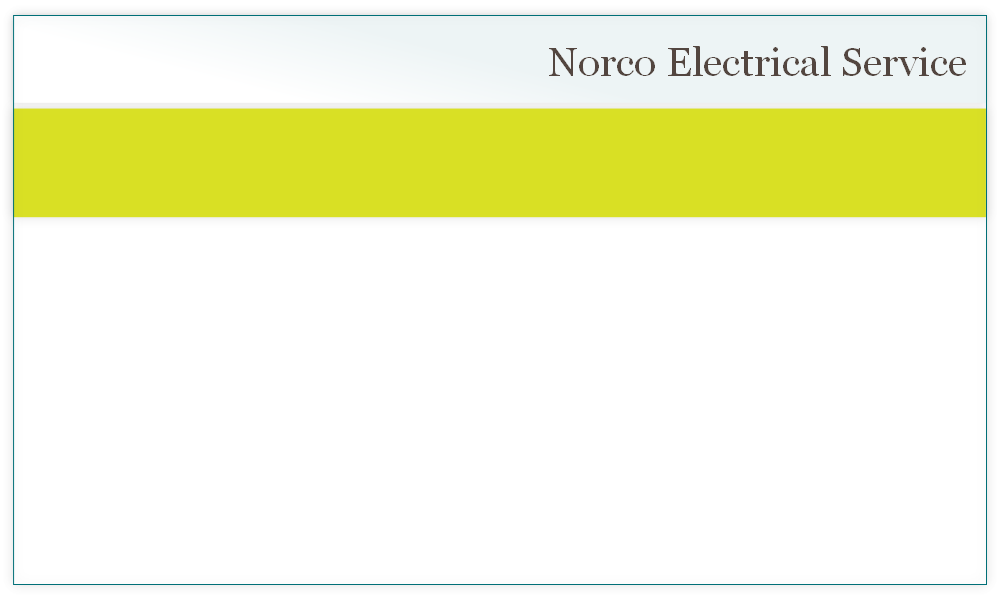Copyright 1996-


Below are some of our more commonly asked questions:

At Norco Residential Electrical Service we know you have many electricians to choose from.
We appreciate the opportunity to earn your business and trust. With over 15 years experience,
including industrial and automation controls in addition to ongoing schooling as an Electrical Engineer
brings knowledge and electrical code background to each job so you can ensure your job will be done right
the first time. Give us a call and see the difference 951-
Q: What is the best way to lower my electric bill?
A: Replace all incandescent lighting with long lasting fluorescent lights. If turning
off lights is a problem in your house (little munchkins running around) consider
timer switches that can be adjusted by the touch of a button to turn off in 5-
Install a whole-
In addition Southern California Edison runs rebate programs for upgrading some outdated appliances. Click here to view SCE rebates
Q: My smoke detector won’t stop chirping, what should I do?
First off, check your batteries; they may need to be replaced. Most newer homes or
those recently remodeled will have linked smoke detectors. These all sound off simultaneously,
even when only one unit detects smoke. In most cases, replacing the battery fixes
the problem. Many "hard-
Q: A light fixture in my house is flickering, what should I do?
A flickering light could be the symptom of several problems. This should be checked. It could be a loose connection in the circuit. It could also be a problem outside your house especially if all the lights in the house seem to be flickering. In any case like this it's best to not use the lights and call Corona Electrical Service
Q: Why do my lights dim or flicker when appliances kick on?
A: This normally only happens in older homes. The reason is basically two fold. Older homes were not wired for the electrical usage of today’s homes and with all the modern day appliances most branch circuits in older homes are just overwhelmed, creating a draw that in turn momentarily dims the lights. Today’s homes have several more branch circuits to spread out the load on any given circuit and the main panels handle double the amperage. The other reason is generally associated with the neutral. A possible solution would be to upgrade your panel but is the cost worth the occasional dimming of your lights.
Q: How can I protect my pricey electronics from a power surge?
A: The best solution to protect your computers, television entertainment systems
and expensive electronic equipment is to have a whole house surge protector installed
in the main electrical panel of your home. Then back is up with surge-
Q: What is a GFI?
A: A GFI is an abbreviation for a Ground Fault Interrupter. It is
a specially designed outlet normally used in wet locations to protect an individual
from electrical shock. A GFI measures the resistance on the "line" and "neutral"
loads connected to it. If there is more resistance in either of the 2 loads, the
GFI trips. The electrical code requires that GFI's be installed in all kitchens,
baths, and laundry areas.
Q: The receptacles in my Kitchen/ Bathroom/ Garage stopped working, what should I check?
A: All new homes and most homes built from the late 1980’s have what are known as GFCI (Ground Fault Circuit Interrupters) installed in all Kitchens, Baths, Laundry rooms, Garages and Outdoors. These devices can control or protect up to 5 additional receptacles. They generally have a red and black button located on the front. These buttons manually turn off and on the receptacle and all others attached to its load. One of the bathrooms generally has a GFCI that if tripped will turn off the receptacles in all other bathrooms. The Kitchen should have 2 GFCIs. The Garage should have one GFCI that protects all the outdoor receptacles and often the laundry room or the laundry room will have its own. CHECK ALL GFCIs TO MAKE SURE THEY HAVEN’T POPPED. RESET. IF PROBLEM CONTINUES THE GFCI WILL NORMALLY HAVE TO BE REPLACED AND THIS WILL SOLVE YOUR PROBLEM 99% OF THE TIME, UNLESS THERE IS A GROUND FAULT IN WHICH CASE YOU WILL HAVE TO TROUBLESHOOT THE CIRCUIT.
Q: The receptacles or power to my room or appliances is out, what should I check?
A: Check the breaker at the main panel to see if it has tripped. Sometimes the breakers look fine and it is difficult to determine which one has tripped. Methodically turn each breaker off and back on in the whole panel. Be sure to turn it all the way to the off position as some breakers (old ones) need to be gracefully forced off. If this does not solve the problem you will need to troubleshoot the branch circuit.
Q: Can I replace a two-
A: Grounded type (three prong) outlets may not be substituted for ungrounded (two prong) outlets unless a ground wire is connected. An exception to this rule is allowed when the outlet is protected by a ground fault circuit interrupter (GFCI).
Q: How can I plug a 4 prong dryer or appliance into a 3 prong outlet?
A: This is one of the most commonly asked questions in FAQ forums about electricity
and wiring.
It must be understood that new appliances will be designed to meet the
newest standards.
It is not reasonable to expect someone to rewire their home because
they need a new dryer or range [stove]!
According to the NEC [National Electrical
Code], it is now required to isolate the neutral conductor from the appliance frame
or chassis.
It used to be allowable to use the neutral as a grounding means by incorporating
a link between the neutral and the chassis.
The problem with this is that, should
the neutral become "open" at some point, the chassis or frame then becomes energized!
The
answer to this safety issue was to require a separate grounding conductor in the
cable feeding the appliance.
The NEC allows the replacement of the new four prong
cord with a three prong cord for appliance replacements in existing installations
only!
It is then required, when the cord is thusly replaced, to establish the frame
grounding link from the chassis to the neutral.
Q: I put new bulbs in my recessed lights and they turn on, stay on for a while, and
they go back out. After a while, they will come back on again. What's going on?
A:
Recessed lights are supplied with a thermal overload. Because the fixture is inside
your ceiling, it is important that excessive heat from the bulbs do not cause a fire.
Because of this, the thermal overload acts as a thermometer i.e. when the heat reaches
a preset temperature, it will disconnect the electric. When the fixture cools down,
the electricity is reconnected. To avoid this problem, lower wattage lamps will generate
less heat, try changing them. The recessed can should have a sticker on the inside
of it listing the lamps which are compatible with it.
Q: What should children know about electrical safety when they play outside?
A: Assume overhead lines are power lines and stay away from them. Do not climb trees, or fly kites near power lines. NEVER attempt to remove something that may be caught on an overhead line.
NEVER touch anyone who is in contact with a power line, call 911.
Get inside at the first sign of lightning. Do not seek shelter under a tree.
Q: How do we keep our pets safe from electrical hazards?
A:Make sure that your pet (s) do not use electrical devices as toys.
The same frayed electrical cord that delivers an electrical shock to an adult, may have enough voltage to kill a dog or cat. Keep electrical cords away from puppies and kittens.
If you have difficulty getting your pet to stop chewing on the cord, you may want to wrap the cord in a thick plastic sleeve. Keep Halogen lamps away from play areas for pets and children. Some Halogen bulbs can reach temperatures of 1,000 degrees. A fire can easily begin, if the lamp knocked over during play. Discourage pets from curling up for a nap behind warm computer equipment.
Q: Is the owner of Corona Electric licensed by the CSLB?
Yes. Eugene maintained his license for years without A SINGLE COMPLAINT. You can check his record on the CSLB website license # 647091.
“I treat your home like it’s my home”